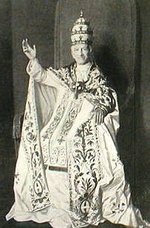Pope Leo XIII
|
|
His Holiness Pope Leo XIII, born Gioacchino Vincenzo Raffaele Pecci (March 2, 1810–July 20, 1903), was Pope of the Roman Catholic Church, having succeeded Blessed Pius IX on February 20, 1878 and reigning until his own death. Born in Carpineto Romano, Italy, Pecci first achieved note as the popular and successful Archbishop of Perugia, which led to his appointment as a Cardinal in 1853.
Pope-leo-xiii-arms.gif
Leo XIII worked to encourage understanding between the Church and the modern world, damaged by Pius IX's uncompromising Syllabus of Errors, issued in 1864, that condemned as heresy 80 propositions, many on political topics, at the foundation of scientific, rational, secular society. He firmly re-asserted the Scholastic doctrine that science and religion co-exist, and required the study of Thomas Aquinas. [1] (http://www.catholic-forum.com/saints/pope0256dd.htm) Although he had stated that it "is quite unlawful to demand, defend, or to grant unconditional freedom of thought, or speech, of writing or worship, as if these were so many rights given by nature to man," he did open some of the Vatican archives to screened historians. He was also the first Pope to come out strongly in favour of the French Republic, upsetting many French monarchists, but his support for democracy did not necessarily imply his acceptance of egalitarianism: "People differ in capacity, skill, health, strength; and unequal fortune is a necessary result of unequal condition. Such inequality is far from being disadvantageous either to individuals or to the community." (Rerum Novarum, 17 [2] (http://www.papalencyclicals.net/Leo13/l13rerum.htm)) His relations with the Italian state were less progressive; Leo XIII continued the Papacy's self-imposed incarceration in the Vatican stance, and continued to insist that Italian Catholics should not vote in Italian elections or hold elected office.
Papal Teachings & Publications
He is most famous for his economic teachings, in which he argued the flaws of capitalism and communism. His 1891 encyclical Rerum Novarum focused on the rights and duties of capital and labor, and introduced the idea of subsidiarity into Catholic social thought.
In his 1893 encyclical Providentissimus Deus, Leo gave new encouragement to Bible study while warning against rationalist interpretations which deny the inspiration of Scripture:
"For all the books which the Church receives as sacred and canonical, are written wholly and entirely, with all their parts, at the dictation of the Holy Ghost: and so far is it from being possible that any error can co-exist with inspiration, that inspiration not only is essentially incompatible with error, but excludes and rejects it as absolutely and necessarily as it is impossible that God Himself, the supreme Truth, can utter that which is not true." (Providentissimus Deus)
The 1896 bull Apostolicae Curae invalidated the ordination of deacons, priests, and bishops in Anglican churches, including the Church of England, while granting recognition to ordinations in the Eastern Orthodox and Oriental Orthodox churches. It also condemned Freemasonry.
His 1899 apostolic letter Testem Benevolentiae condemned the heresy called Americanism.
Pope-leo-xiii-02.jpg
Trivia
- Pope Leo XIII awarded a gold medal [3] (http://www.wings.buffalo.edu/aru/preprohibition.htm) to a fashionable 19th century cocaine-based drink called Vin Mariani, the drink that inspired Coca-cola. Vin Mariani was also praised and used by Queen Victoria and Pope Saint Pius X.
- Pope Leo XIII was the first Pope of whom a sound recording was made. The recording can be found on a compact disc of Alessandro Moreschi's singing.
- Leo approved the foundation of a Catholic university in the United States in 1887, which became The Catholic University of America.
- At the time of his death, Leo XIII was the second-longest reigning pope, exceeded only by his immediate predecessor, Blessed Pope Pius IX (unless one counts Saint Peter as having reigned from the time that Jesus is said to have given him "the keys to the kingdom" until his death, rather than from his arrival in Rome). Leo XIII's regnal length was subsequently exceeded by that of Pope John Paul II.
External links
- Pope Leo XIII texts and biography (http://www.vatican.va/holy_father/leo_xiii/index.htm) from the Vatican
- Pope Leo XIII (http://www.newadvent.org/cathen/09169a.htm) in the Catholic Encyclopedia (http://www.newadvent.org/cathen/)
- Pope Leo XIII, overview of pontificate (http://www.catholic-forum.com/saints/pope0256.htm)
- Etexts of his encyclicals and other documents (http://www.papalencyclicals.net/Leo13/)

